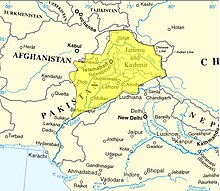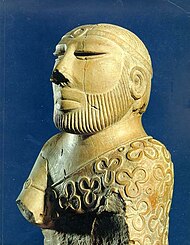Sikha Shahi

Part of a series on the |
|---|
| History of Pakistan |
 |
| Timeline |
| Ancient
|
| Classical
|
| Medieval
|
| Early modern
|
| Modern
|
| History of provinces |
|
|
Sikha-Shahi is used to denote the high-handedness of a ruler. The term originated during the rule of Maharaja Ranjit Singh of the Sikh Empire[1][2] in Punjab, which stretched from the Kashmir valley[3] to the mouth of the Khyber Pass. About 70 per cent of the subjects of the Sikh ruler were Muslim.[4] Allegedly, during the Sikh period in Lahore, curb to religious freedom and economic suppression were imposed on Muslim subjects.[5] The Sikh rule was dubbed ‘Sikha-Shahi’ by the aggrieved Muslim elite.[6] The phrase now refers to the rule of a monarchy[7] or unfavourable court orders[8] in Pakistan, especially in the Punjab province.[9][10]
See also
- Battle of Shopian
- Sikh period in Lahore
- Treaty of Amritsar (1846)
- Religious discrimination in Pakistan
- Chhota Ghallughara
- Vadda Ghalughara
- Military coups in Pakistan
- Sikh Empire
- Islam and Sikhism
Notes
- ^ Tandon, Prakash (1968). Punjabi Century, 1857-1947. University of California Press. p. 10. ISBN 978-0-520-01253-0.
- ^ Nevile, Pran (2006-07-07). Lahore. Penguin Random House India Private Limited. ISBN 978-93-86651-91-4.
- ^ Lawrence, Sir Walter Roper (2005). The Valley of Kashmir. Asian Educational Services. ISBN 978-81-206-1630-1.
- ^ Hasan, Prof M. (2002). HISTORY OF ISLAM (2 Vols. Set). Adam Publishers & Distributors. ISBN 978-81-7435-019-0.
- ^ "Back to Sikha Shahi rule?". Pakistan Today. Retrieved 2020-03-20.
- ^ Kamal, Ajmal (2015-01-11). "COLUMN:The uses of language snobbery:Urdu & the identity politics". DAWN.COM. Retrieved 2020-03-20.
- ^ Shehzad, Rizwan (2018-03-06). "'Arbitrary rule': Sharif asks people to revolt against 'sikha shahi'". The Express Tribune. Retrieved 2020-03-20.
- ^ "Court must act against Nawaz for 'Sikha Shahi' remark: Kaira". The Nation. 2017-12-21. Retrieved 2020-03-20.
- ^ Allen, Charles (2012-06-21). Soldier Sahibs: The Men Who Made the North-West Frontier. John Murray Press. ISBN 978-1-84854-720-9.
- ^ Reporter, The Newspaper's Staff (2018-03-06). "Ex-PM talks about power of vote again". DAWN.COM. Retrieved 2020-03-20.













